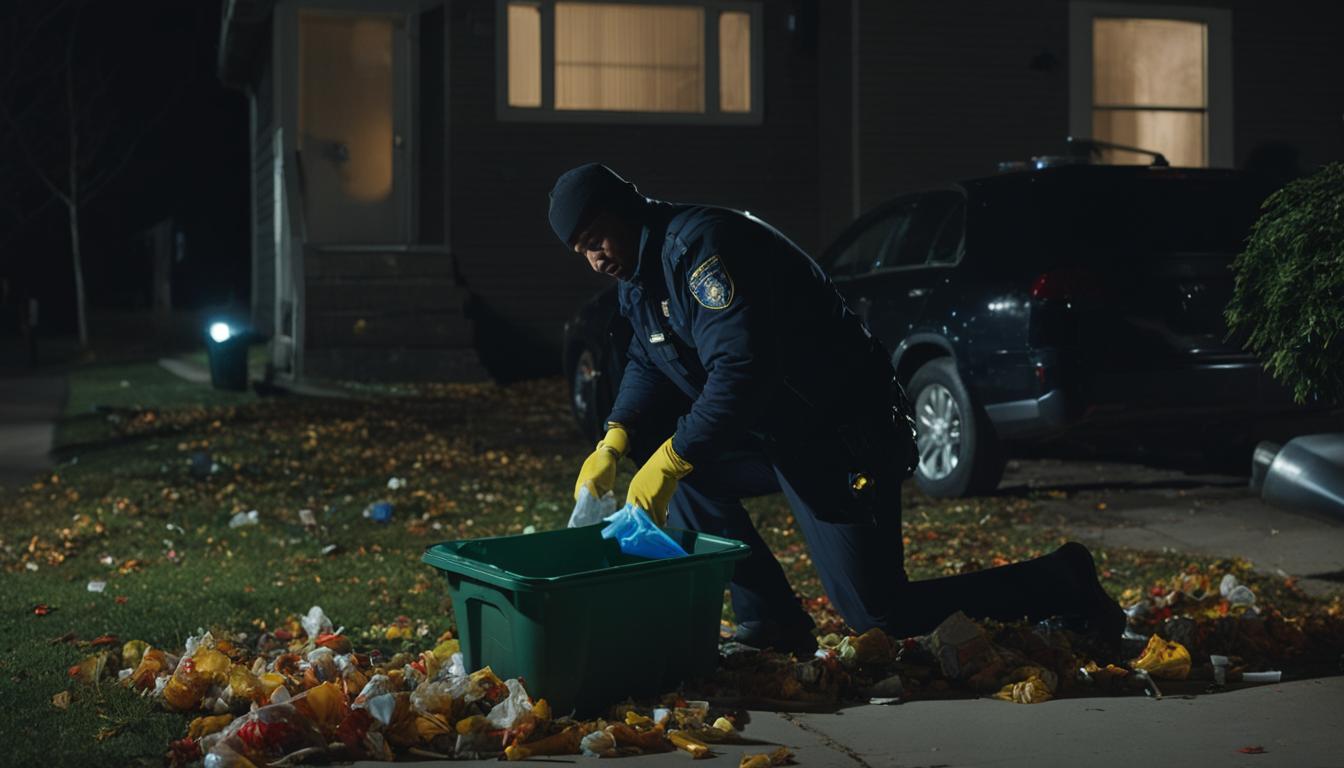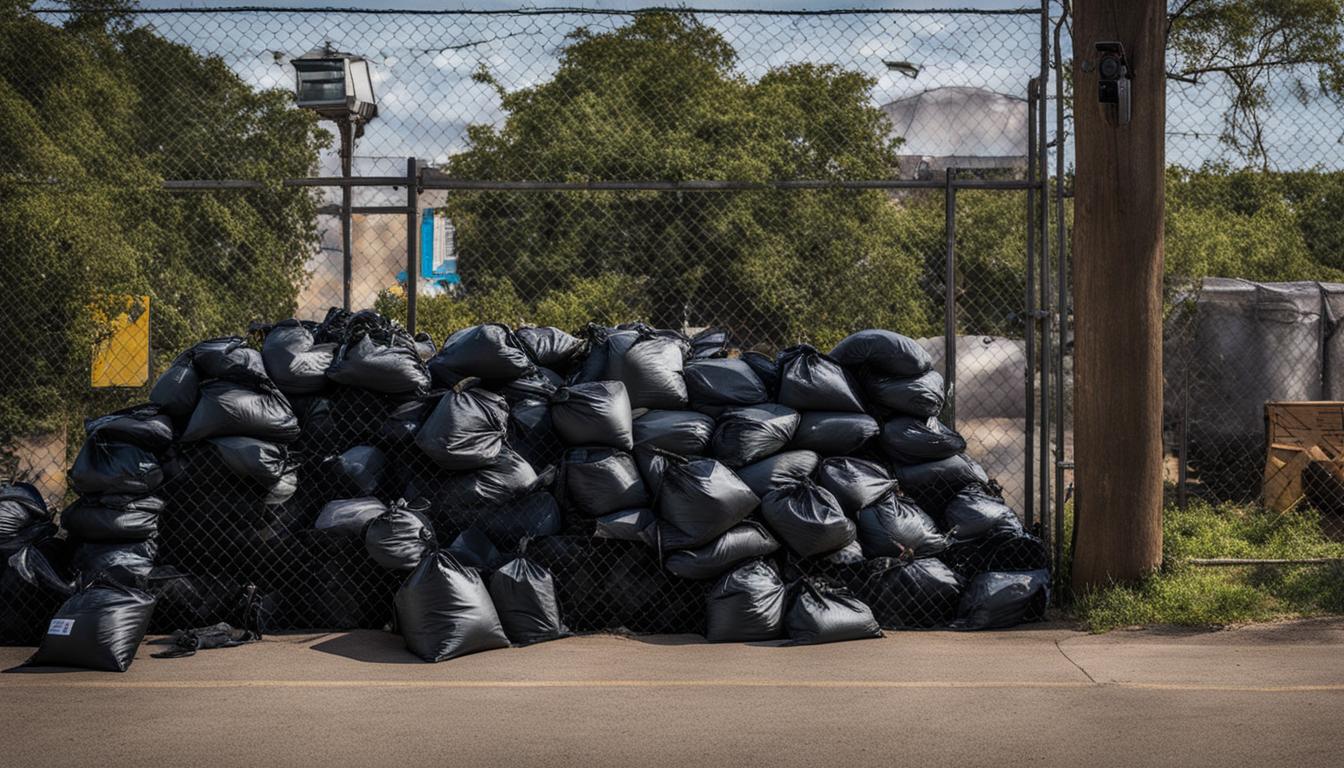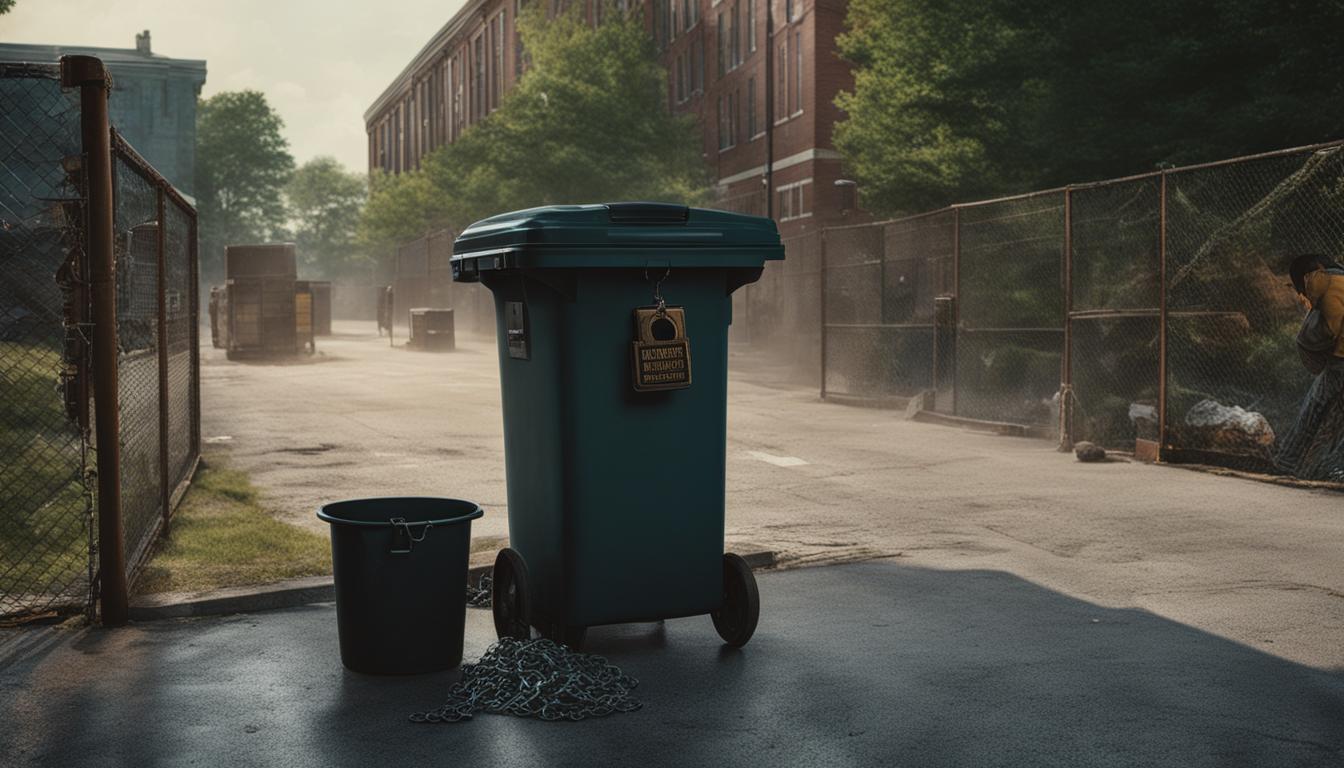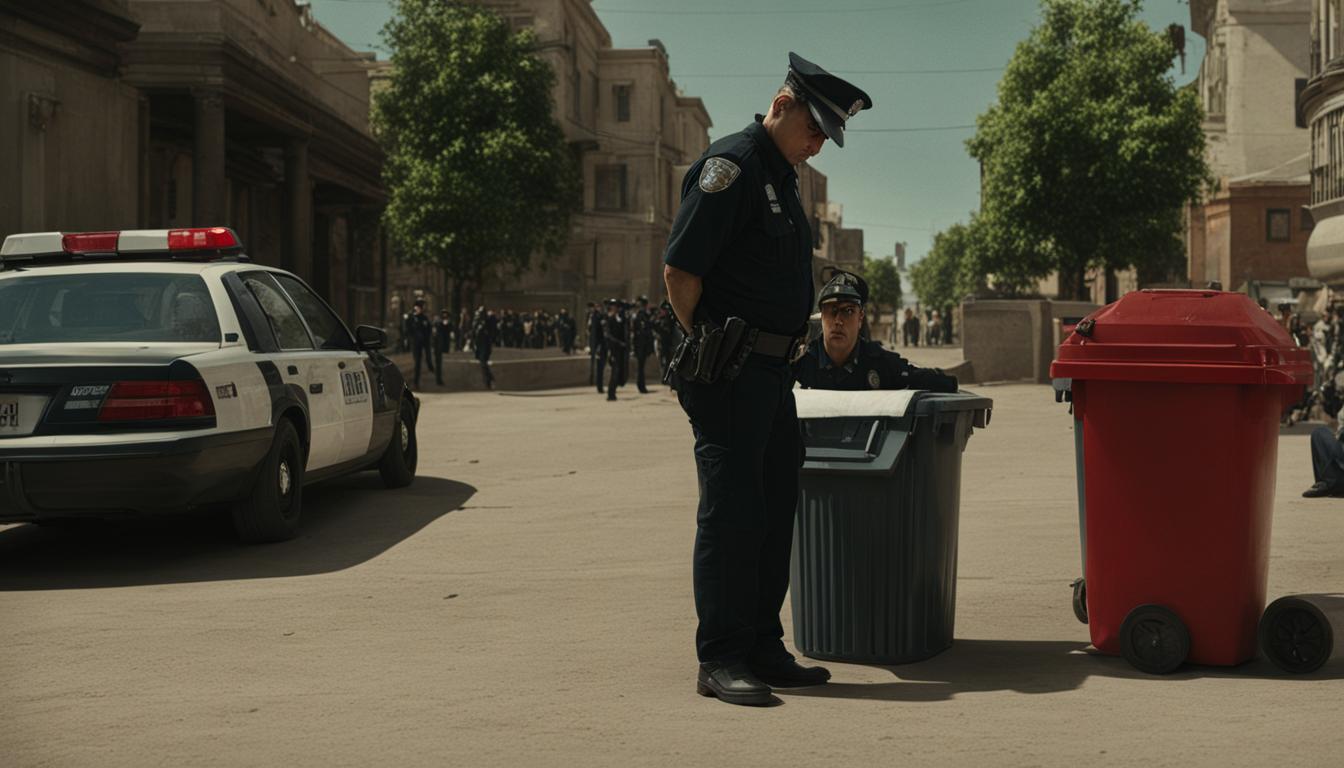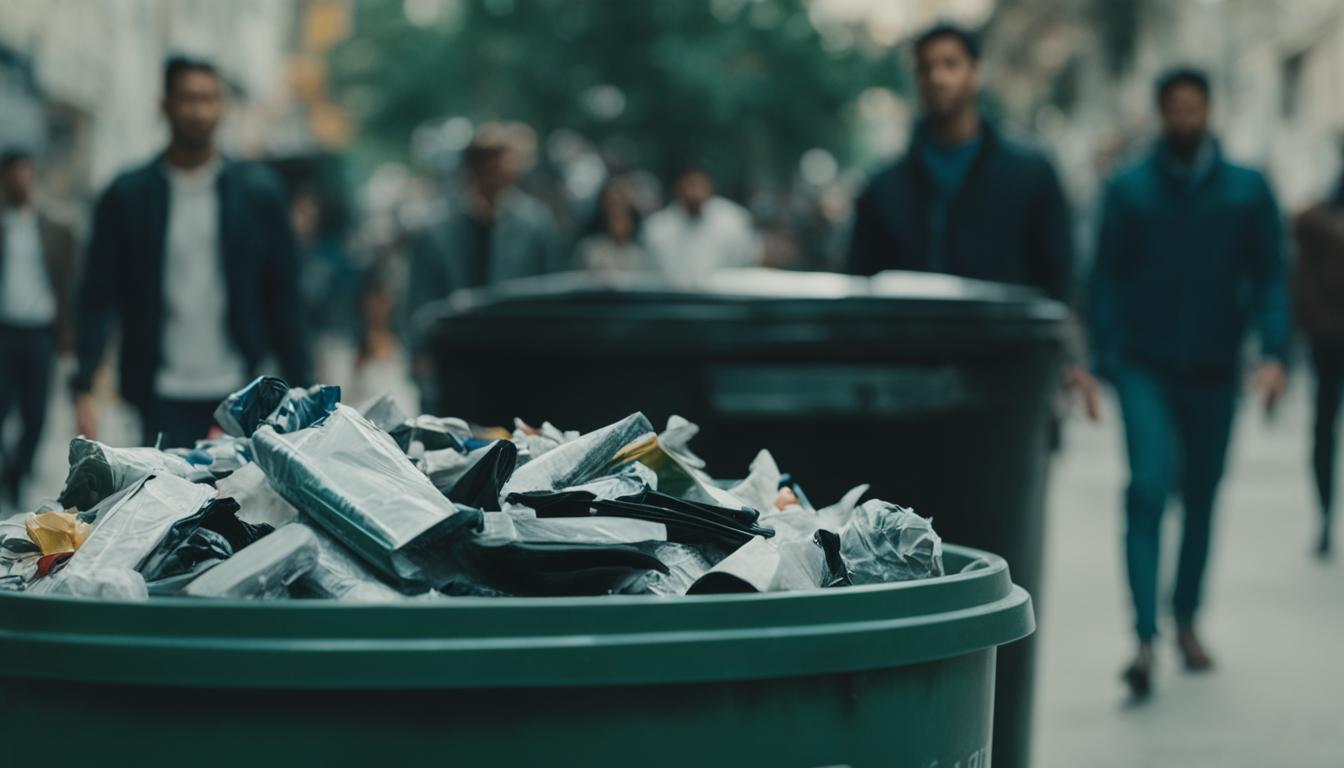Disclosure: This Post Contains Affiliate Links; We earn a commission on purchases.
If you’ve ever wondered about the legality of someone going through your trash in Michigan, you’re not alone. Trash privacy laws and regulations can vary in different states, including Michigan. Understanding the rules around trash digging, scavenging, and dumpster diving is important to protect your privacy and avoid any potential legal issues.
Key Takeaways:
- Garbage placed on the side of the road in Michigan is generally considered public property and can be scavenged by anyone.
- Some communities in Metro Detroit have their own ordinances that make it illegal to rummage through others’ trash.
- Dumpster diving is generally not illegal in Michigan, but some cities and townships may have specific bans in place.
- Diving into dumpsters on private property without permission is expressly prohibited and can result in fines or arrest.
- Protect your trash privacy by shredding sensitive documents and taking extra precautions to secure your trash.
Trash Privacy Laws in Michigan
In the state of Michigan, garbage placed at the side of the road is considered public property. This means that once you put your trash out for collection, anyone can legally go through it. However, some communities in Michigan have their own laws in place that make it illegal to scavenge or pilfer items from trash left at the curb. These ordinances vary from community to community, so it is important to check the specific regulations in your area.
Additionally, diving into dumpsters or removing items left on the side of the road is prohibited in cities like Detroit, Warren, and Ann Arbor. It is also important to respect private property rights and avoid diving into dumpsters on private premises where there are no trespassing signs.
If you’re wondering whether it’s legal for someone to go through your trash in Michigan, it’s essential to understand the state’s trash privacy laws. While garbage placed at the side of the road is generally considered public property, certain communities have implemented regulations to protect individuals’ privacy and property rights.
Community-Specific Regulations
Trash disposal regulations can vary from community to community in Michigan. Some towns and cities have specific ordinances in place that make it illegal to scavenge or pilfer items from trash left at the curb. Before assuming that it is legal to go through someone else’s trash, it is important to check the regulations in your particular area.
Prohibited Dumpster Diving
In cities like Detroit, Warren, and Ann Arbor, diving into dumpsters or removing items left on the side of the road is explicitly prohibited. These cities have implemented rules to safeguard public safety and maintain cleanliness in public spaces. Violating these regulations can result in fines or other legal penalties.
Respecting Private Property Rights
In addition to following local regulations, it is crucial to respect private property rights. Dumpster diving on private premises without permission is considered trespassing and can lead to legal consequences. Always be mindful of the presence of “no trespassing” signs and avoid diving into dumpsters located on private property.
By understanding trash privacy laws, disposal regulations, collection rules, and property rights in Michigan, you can navigate the issue of someone going through your trash with confidence and ensure that you are in compliance with applicable laws.
Next, we will explore dumpster diving regulations in Michigan, shedding light on the legality of this activity and the potential consequences of violating related laws.
Dumpster Diving Regulations in Michigan
Dumpster diving, which involves searching through dumpsters for discarded items, is generally legal in Michigan. Michigan law does not specifically prohibit people from diving into dumpsters on public property. However, some cities and townships in Michigan, such as Detroit, Warren, and Ann Arbor, have passed ordinances that make it illegal to go into dumpsters or remove items placed on the curb for garbage collection. It is important to note that diving into dumpsters on private property without permission is expressly prohibited and can result in fines or even arrest.
If you’re planning to engage in dumpster diving, it is crucial to be aware of the regulations in your specific area. While it may be legal to dive into dumpsters on public property in Michigan, certain cities and townships have their own laws that restrict or ban the practice. To avoid any legal issues, it is advisable to research and familiarize yourself with the dumpster diving laws in your locality.
In addition, it is important to respect private property rights and refrain from diving into dumpsters on private premises without permission. Trespassing on private property can have serious legal consequences, including fines and potential arrest. Always prioritize your safety and abide by the laws and regulations in place to ensure a positive dumpster diving experience.
Remember, dumpster diving can be a sustainable way to repurpose discarded items and reduce waste. However, it is essential to practice responsible diving and respect the boundaries set by local ordinances and property owners.
Protecting Trash Privacy in Michigan
While the legality of going through someone’s trash in Michigan may vary depending on the community, it is important to consider privacy rights when it comes to garbage disposal. Even though trash placed on the side of the road is generally considered public property, individuals should still take precautions to protect their privacy.
One effective way to safeguard personal information is by shredding sensitive documents, such as financial statements and other papers containing personal data, before disposing of them. By doing so, individuals can minimize the risk of identity theft or unauthorized access to their personal information.
Another measure individuals can take to protect their trash privacy is by ensuring that their garbage is securely covered or locked in a container. This can help deter others from rummaging through the trash and invading their privacy.
“Proper disposal of sensitive documents and securing your trash are important steps in protecting your privacy rights,” says Jane Johnson, a privacy advocate.
“Implementing these simple practices can help individuals maintain control over their personal information and reduce the risk of potential misuse or unauthorized access.”
Privacy Protection Measures for Trash Disposal
| Privacy Protection Measures | Description |
|---|---|
| Shredding sensitive documents | Destroying documents containing personal information before disposal reduces the risk of identity theft and unauthorized access. |
| Securely covering or locking trash containers | Preventing easy access to trash discourages rummaging and helps safeguard privacy rights. |
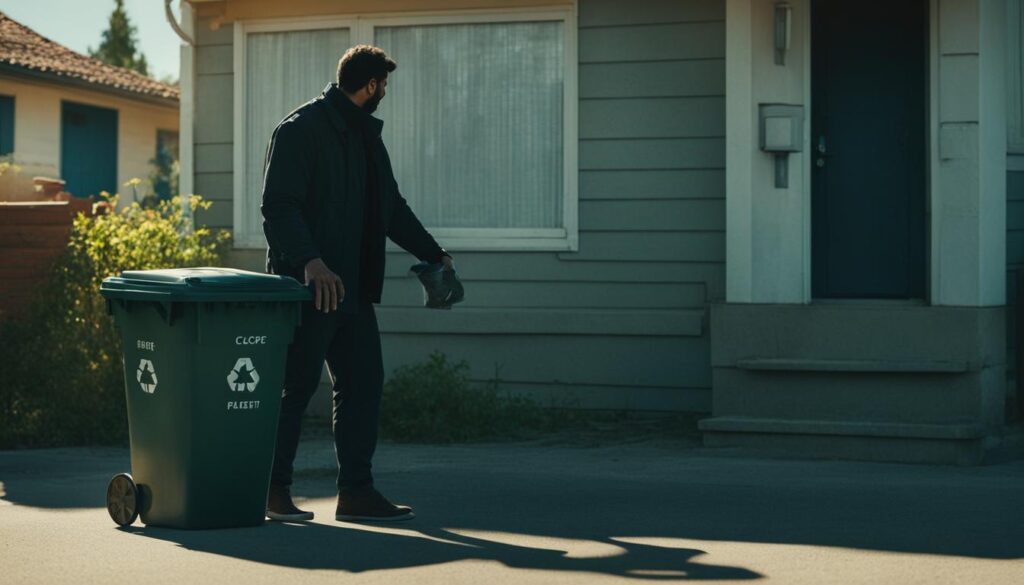
Potential Consequences for Violating Trash Privacy Laws
Violating trash privacy laws in Michigan can have serious legal repercussions. Whether you’re scavenging through trash in a community where it is prohibited or engaging in dumpster diving on private property without permission, there are potential fines, penalties, and even arrest involved.
“Violating trash privacy laws can result in fines and penalties, so it’s important to understand and respect the regulations in your area.”
If you are caught scavenging through trash in a community where it is prohibited, you may face fines or other penalties imposed by local authorities. These consequences are in place to protect the privacy and property rights of individuals who place their trash out for collection.
Dumpster diving on private property without permission is considered trespassing and can result in legal action. Fines or even arrest can be issued for engaging in this activity without the owner’s consent.
Respecting Privacy and Property Rights
It’s crucial to be aware of the specific regulations governing trash privacy in your area. By understanding and respecting these laws, you can avoid potential legal trouble and contribute to a safer and more secure community.
Remember:
- Always check if your community has specific bans or ordinances in place regarding trash scavenging or dumpster diving.
- Do not engage in trash digging in communities where it is prohibited, as it can lead to fines and penalties.
- Respect private property rights and avoid entering dumpsters or removing items from private premises without permission.
Summary of Consequences
Violating trash privacy laws, whether intentionally or unknowingly, can have serious legal consequences. To protect yourself and abide by the law:
- Be aware of the specific trash privacy regulations in your community.
- Respect the privacy and property rights of others.
- Avoid scavenging through trash where it is prohibited.
- Obtain permission before engaging in dumpster diving on private property.
Public Perception of Trash Scavenging
When it comes to the public perception of trash scavenging, opinions are divided. Some people see dumpster diving and going through trash as a way to reduce waste and find useful items. They view it as a form of recycling and repurposing, helping to minimize the amount of waste sent to landfills.
On the other hand, there are those who view trash scavenging as an invasion of privacy or unsightly behavior. They believe that once something is discarded, it should be left alone and not subjected to further scrutiny. For them, going through someone’s trash is seen as a violation of personal boundaries.
Community attitudes towards scavenging also differ. Some communities have implemented strict regulations to deter trash pickers, while others may adopt a more lenient approach. These attitudes are influenced by factors such as local cultural norms, environmental consciousness, and the perceived impact of scavenging on the community’s aesthetic appeal.
It is important to be respectful of others’ viewpoints when it comes to trash scavenging and abide by the laws and regulations in your area. Understanding the varied perspectives on this practice can foster better community relations and ensure a harmonious coexistence.
Benefits of Trash Scavenging
While some individuals may criticize trash scavenging, it is essential to recognize its potential advantages:
- Reduction of waste: Scavenging through trash can help divert usable items from the landfill, contributing to waste reduction efforts and promoting sustainability.
- Resourcefulness and frugality: Dumpster diving allows individuals to find free or inexpensive items, reducing the need to purchase new goods and potentially saving money.
- Opportunity for reuse and recycling: By salvaging discarded items, trash scavengers give them a second life, preventing them from going to waste and reducing the demand for new products.
Drawbacks of Trash Scavenging
While there are potential benefits, it is important to consider the drawbacks and risks associated with trash scavenging:
- Health and safety hazards: Trash can contain sharp objects, broken glass, or hazardous materials, posing risks to those who rummage through it. Care should be taken to avoid injury or exposure to harmful substances.
- Legal consequences: Dumpster diving may be prohibited in certain areas or on private property. Violating these regulations can result in fines or even legal repercussions such as trespassing charges.
- Perceived social stigma: Despite efforts to reduce waste, dumpster diving is still often stigmatized, with some people viewing it as an unappealing or shameful activity.
Before engaging in trash scavenging, individuals should carefully weigh the pros and cons, considering their own comfort level, the potential risks involved, and the legal implications in their specific area.
Community Quotes on Trash Scavenging
“I think dumpster diving is a smart way to reduce waste and find useful items. It’s like treasure hunting for things someone else doesn’t want.” – Rachel, Denver
“Dumpster diving is just plain gross. It’s a violation of privacy, and people should find their own stuff instead of going through someone else’s garbage.” – Mark, Seattle
“In our community, trash scavenging is seen as a way to reduce waste and support a more sustainable lifestyle. We even have designated areas where people can leave items they no longer need for others to take.” – Sarah, Austin
| Pros | Cons |
|---|---|
| Reduces waste | Potential health and safety hazards |
| Promotes resourcefulness | Legal consequences in certain areas |
| Encourages reuse and recycling | Perceived social stigma |
Advantages and Disadvantages of Dumpster Diving
Dumpster diving, also known as trash picking, can offer both advantages and disadvantages for those willing to engage in this activity. It is important to consider these factors before delving into the world of scavenging through trash. Here, we will explore the benefits, drawbacks, and risks associated with dumpster diving.
Advantages of Dumpster Diving
1. Waste Reduction: Dumpster diving can significantly contribute to waste reduction by salvaging usable items that would otherwise end up in landfills. This helps promote sustainability and environmental consciousness.
2. Free or Inexpensive Finds: One of the main advantages of dumpster diving is the opportunity to find free or inexpensive items. From furniture and appliances to clothing and books, dumpsters can be a treasure trove of hidden gems.
Drawbacks of Dumpster Diving
1. Physical Demands: Dumpster diving can be physically demanding, requiring individuals to climb, lift, and maneuver through sometimes cramped and dirty spaces. It is essential to have the physical stamina and capabilities to engage in this activity safely.
2. Potential Hazards: Dumpsters may contain sharp objects, broken glass, or other potential hazards. It is crucial to exercise caution and wear appropriate protective gear to minimize the risk of injury while scavenging through trash.
| Advantages of Dumpster Diving | Drawbacks of Dumpster Diving |
|---|---|
|
|
Risks of Going Through Trash
1. Legal Consequences: Depending on your location and local regulations, there may be legal restrictions on dumpster diving. Engaging in this activity where it is prohibited could result in fines, penalties, or even arrest for trespassing or violating privacy laws.
2. Personal Safety: Dumpster diving carries inherent risks to personal safety. Besides potential physical hazards within the dumpster, encounters with wild animals, contaminated items, or unpleasant odors can pose health risks. It is crucial to prioritize personal safety and hygiene throughout the process.
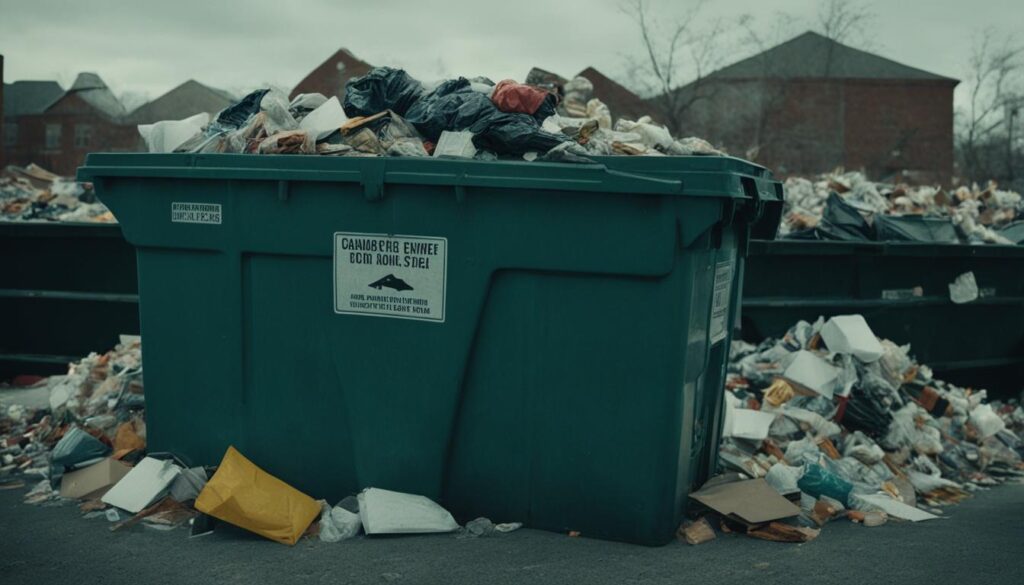
Conclusion
In conclusion, the trash privacy laws in Michigan can be complex and vary from community to community. While the state considers garbage placed on the side of the road as public property, some areas have implemented ordinances that make it illegal to scavenge or dive into dumpsters. It is important to respect the privacy and property rights of others and be aware of the regulations specific to your area.
When it comes to dumpster diving, it is a controversial practice with both advantages and disadvantages. On the positive side, it can help reduce waste and provide access to free or inexpensive items. However, there are risks involved, including potential physical hazards and legal consequences if diving into dumpsters is prohibited in your community.
Ultimately, individuals should consider their own comfort level, the potential risks, and the legal implications before engaging in dumpster diving. It is important to make an informed decision and abide by the laws and regulations in your area to ensure a respectful and lawful approach to trash scavenging.
Source Links
- https://wcrz.com/is-it-legal-to-go-dumpster-diving-in-michigan-lets-find-out/
- https://residentnews.net/2020/04/02/is-it-legal-for-someone-to-go-through-your-trash/
- https://www.freep.com/story/news/local/michigan/oakland/2019/02/27/garbage-picking-trash-scrapper-law-michigan/2951958002/

Subscribe to Our Newsletter

